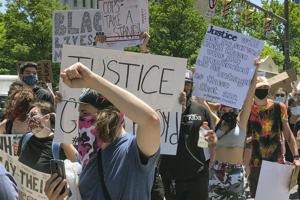Review: Columbus unprepared for last summer’s protests

(The Center Square) – An independent review of how the Columbus Police Department reacted to protests last summer after George Floyd’s death says the city was unprepared by for the size and energy of the protests and police failed to adhere to national standards for emergencies.
The review, conducted by the John Glenn College of Public Affairs at The Ohio State University, was presented Monday to the Columbus City Council.
“We welcome the final report on police response to protests last summer, and recommendations on how we can encourage free and open demonstrations while maintaining public safety,” Columbus Mayor Andrew Ginther said Monday night via Twitter. “We were aware of clear mistakes and the mishandling of protests early last summer, and we have since made significant changes, including the ban on chemical agents on nonviolent protestors. The report does underscore the continued need for reform. I am pleased that since last summer, Columbus police have managed countless demonstrations with relatively little use of force, few arrests and where the voice of demonstrators was not in any way stifled. Still, we have a long way to go to restore trust and confidence in police, and this report is one more tool to help us make the change the community demands.”
The report also said the department was caught off guard by community members’ feelings toward police, and many officers felt let down by department and city leadership.
“In retrospect, it was clear the way CPD and its officers treated communities of color was the primary focus of the protest, but Columbus law enforcement personnel were caught off guard by the intensity of the antagonism directed toward them,” the report reads. “Our interviews revealed a large rift between CPD and the community, particularly communities of color. There is distrust, anger and fear directed towards the police that not only undermines the basic functionality of the criminal justice system, but also sows the seeds for future conflictual protests.”
The report recommended, among other things, the city and police take steps toward reconciliation with disgruntled and angry community members, particularly in the Black community. It also recommended the city should consider establishing special units to contact activists and demonstrators before, during and after protests.
The review noted there were positive interactions between police and protesters, saying police often showed restraint in the face of vicious insults, along with thrown bottles, bricks and difficult days.
“But these moments were overshadowed by frustration and pain on all sides,” the report reads. “Protestors interviewed for this study felt that police overreacted, used unnecessary force on peaceful demonstrations and treated Black protestors and protests about racism differently than other protests. Many police interviewed for this study felt abandoned by the city’s leaders and let down by their own leadership.”
The protests led to damage to downtown offices, stores, restaurants, bars and theaters, and some were set on fire. No one died in the events, but the report said hundreds of police officers and protesters experienced physical harm and mental trauma.
The review pointed out community members felt empowered by the protests, which included some elected officials during the daylight hour, along with “agitators intent on promoting conflict.” At night, however, the protests sometimes turned into a physically combative confrontation “between police, protestors and some agitators intent on promoting conflict.”
CPD deployed 1,400 officers, used 1,370 rounds of munitions and arrested 147 protesters from late-May to mid-July, according to the report.
The review was commissioned by city leaders in July. It included more than 170 interviews with participants and observers, along with review of documents, data and publicly available news footage and other multimedia.
Floyd, an unarmed Black man, was killed by former Minneapolis police officer Derek Chauvin on Memorial Day. Chauvin was convicted last week of second-degree unintentional murder, third-degree murder and second-degree manslaughter in the death.
Disclaimer: This content is distributed by The Center Square

